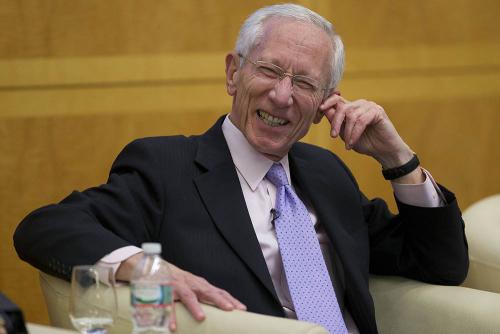Just when we thought that the Fed is pulling an Obama and has “no strategy” to deal with what Deutsche Bank proclaimed was the bubble to end, or rather extend, all bubbles….
Deutsche Bank had Deutsche Bank proclaimed
The bubble probably needs to continue in order to sustain the current global financial system and the necessary future deleveraging. However with yields moving ever lower in many parts of the world in recent times, partly due to weak growth, and with debt levels still moving higher, the chances are that most government bondholders are unlikely to achieve a positive real return over the medium to long-term from this starting point. Inflation or even the risk of sovereign restructuring will likely prevent this.
The Fed surprise us once again when it reported that it has formed a committee. The committee will be led by the former head of the Bank of Israel – best known for using de novo created fiat money to buy AAPL stock as part of “prudent monetary policy” – Vice Chairman Stanley Fischer, to monitor financial stability. The committee, according to Bloomberg, is “reinforcing the Fed’s efforts to avoid the emergence of asset-price bubbles.”
Because contrary to what even five-year-olds know by now, the Fed is supposedly not promoting the emergence of bubbles but is actually “avoiding” them. No, really.

From Bloomberg on the Fed’s committee for the prevention of asset bubbles:
Joining Fischer on the Committee on Financial Stability are Governors Daniel Tarullo and Lael Brainard, according to the central bank’s latest Board Committee list.
Fed officials want to ensure that six years of near-zero interest rates don’t lead to a repeat of the excessive risk-taking that fanned the U.S. housing boom and subsequent financial crisis.
“They’re putting the varsity team on it, but whether or not they’re going to be able to call bubbles better than anyone else is really is an open question,â€Â Drew Matus, deputy U.S. chief economist at UBS Securities LLC in New York, said in an interview yesterday.
Sharpening the issue, measures of volatility across stocks, bonds and currencies worldwide have declined to record or multi-year lows this year, in a potential sign of investor complacency.
Fischer’s committee joins the Fed’s Office of Financial Stability Policy and Research, led by Nellie Liang, a senior Board economist, on the lookout for signs of market excess.
The creation of the new committee was reported earlier by the Wall Street Journal.
One purpose of the committee is to help ensure that staff working on financial stability issues can easily flag their findings at the Fed’s highest level.

